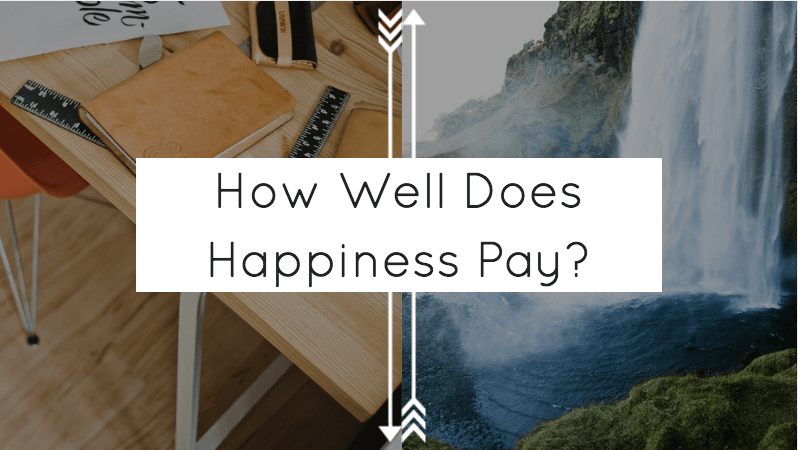There are a lot of factors that play into accepting the right job. Of course there’s company, location, timing, title and salary. Accepting a complex role with a great title in a place you love sounds like the perfect setup, but what if that job pays significantly less than the others in your field? Will a lower income affect your overall job satisfaction or make day-to-day expenses difficult to cover? What if your dream job offers your dream salary but a year into the position you realize it’s anything but what you had hoped for? At what cost do you leave for a role with lower compensation? These questions aren’t intended to make you second guess your career choices, but consider how compensation plays a role in decision making and overall job satisfaction. So let’s take a deep dive into how salary influences overall happiness when we let income determine our roles or completely ignore income when choosing a career path. We spoke to a group of experts at GigSesh who provide career advice about the importance of money in their career decisions and happiness. When asked if the jobs they have loved the most have paid the best, the majority of people said yes, but on the other hand less than 15% said that salary was the most influential factor when picking a job or career. One expert, Vicente DyReyes, began his career as an investment banker in which he was the highest paid in his age bracket but also on the lowest end of the happiness scale. Now as the Founder & CEO of mise en place (mepNYC), he tells us that “happiness at work and at home has driven career decisions thus far.” DeReyes states that “finding happiness in your career is extremely attainable, and money isn’t even at the table to drive the decision.” They say that money can’t buy you happiness, but living paycheck to paycheck doesn’t sound like happiness either. Based on studies done across the United States, an average household income of 75K or higher does not correlate with overall happiness. While money might not be the only decisive element in career decisions, most young professionals desire compensation that will allow them to achieve or exceed this income. With a competitive job market and rising real estate and food costs, money is more sought after than ever, especially in large cities with notoriously high costs of living cough New York City and San Francisco cough. Yet 64% of Millennials would rather make $40K a year at a job they love than $100K a year at a job they think is boring. So more than ever, people are pondering if they should pick between a career of passion or a career that ensures a high income.
When asked about how salary has influenced happiness at work, GigSesh expert Elise Giannasi told us that “In the past, I’ve used money as an indicator for the level of the job but also for how hard I’ll need to work. Working in jobs like HR or even consulting, your role can be rather similar regardless of the company. The more you are paid to do that job, the higher the expectation that you’ll always be on and the greater the responsibility and pressure. The money is great at first but the overtime hours lead to emotional, mental and physical burnout — which eventually outweighs any positives the higher paycheck brought.” Some people are lucky enough to have passions that don’t make income and happiness mutually exclusive; software engineers who love writing code will most likely always be on the high end of the pay scale. Musicians who strive to be on stage might have a more difficult time supporting themselves when following their passion. The majority of us fall somewhere in the middle of these two extremes, wanting a career that is interesting, challenging and creative, but also pays well and has a promising future. Kevin Siskar, a Managing Director at Founder Institute New York believes that “the time we are given to live is a more scarce and precious resource than money. I believe you can make money doing most things in this world, so while it might take longer to get there at times, it’s best to make money doing something you enjoy. The earlier in life you realize this the more time you have to capitalize and grow while on the path you desire.” So why is it that so many people ask if they should pick between a career that brings happiness or a career that brings a higher paycheck? With rising education costs, it’s difficult to graduate without loans and justify a career that is not lucrative after putting yourself into debt. The fact that we’re able to have this discussion at all is a luxury as many people don’t have the opportunity to do what they love and simply do what they must to survive. Being grateful for the opportunities that you have and making the most of them is just as important as questioning if job satisfaction leads to a happier life than higher earnings. Some people will spend long hours and overnights in the office to earn huge paychecks and live a lavish lifestyle once off the clock. Others value their free time more and choose career paths that may not pay as handsomely but provide compensation in the form of flexible hours and laid back work environments. So instead of asking if you should pick a career that brings you happiness or pick one that pays, think about whether a high paycheck or a passion-driven career is more important to you. Want to hear more from career experts about their professional experiences and get some personalized career advice? Check out GigSesh’s superhero roster of experts and sign up to book a call with someone who can help you find success while following your passion.

